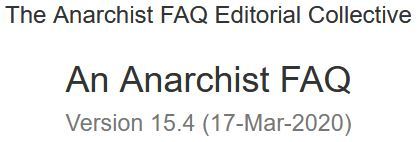#grassroots
Text

A.2.11 Why are most anarchists in favour of direct democracy?
For most anarchists, direct democratic voting on policy decisions within free associations is the political counterpart of free agreement (this is also known as “self-management”). The reason is that “many forms of domination can be carried out in a ‘free.’ non-coercive, contractual manner… and it is naive… to think that mere opposition to political control will in itself lead to an end of oppression.” [John P. Clark, Max Stirner’s Egoism, p. 93] Thus the relationships we create within an organisation is as important in determining its libertarian nature as its voluntary nature (see section A.2.14 for more discussion).
It is obvious that individuals must work together in order to lead a fully human life. And so, ”[h]aving to join with others humans” the individual has three options: “he [or she] must submit to the will of others (be enslaved) or subject others to his will (be in authority) or live with others in fraternal agreement in the interests of the greatest good of all (be an associate). Nobody can escape from this necessity.” [Errico Malatesta, Life and Ideas, p. 85]
Anarchists obviously pick the last option, association, as the only means by which individuals can work together as free and equal human beings, respecting the uniqueness and liberty of one another. Only within direct democracy can individuals express themselves, practice critical thought and self-government, so developing their intellectual and ethical capacities to the full. In terms of increasing an individual’s freedom and their intellectual, ethical and social faculties, it is far better to be sometimes in a minority than be subject to the will of a boss all the time. So what is the theory behind anarchist direct democracy?
As Bertrand Russell noted, the anarchist “does not wish to abolish government in the sense of collective decisions: what he does wish to abolish is the system by which a decision is enforced upon those who oppose it.” [Roads to Freedom, p. 85] Anarchists see self-management as the means to achieve this. Once an individual joins a community or workplace, he or she becomes a “citizen” (for want of a better word) of that association. The association is organised around an assembly of all its members (in the case of large workplaces and towns, this may be a functional sub-group such as a specific office or neighbourhood). In this assembly, in concert with others, the contents of his or her political obligations are defined. In acting within the association, people must exercise critical judgement and choice, i.e. manage their own activity. Rather than promising to obey (as in hierarchical organisations like the state or capitalist firm), individuals participate in making their own collective decisions, their own commitments to their fellows. This means that political obligation is not owed to a separate entity above the group or society, such as the state or company, but to one’s fellow “citizens.”
Although the assembled people collectively legislate the rules governing their association, and are bound by them as individuals, they are also superior to them in the sense that these rules can always be modified or repealed. Collectively, the associated “citizens” constitute a political “authority”, but as this “authority” is based on horizontal relationships between themselves rather than vertical ones between themselves and an elite, the “authority” is non-hierarchical (“rational” or “natural,” see section B.1 — “Why are anarchists against authority and hierarchy?” — for more on this). Thus Proudhon:
“In place of laws, we will put contracts [i.e. free agreement]. — No more laws voted by a majority, nor even unanimously; each citizen, each town, each industrial union, makes its own laws.” [The General Idea of the Revolution, pp. 245–6]
Such a system does not mean, of course, that everyone participates in every decision needed, no matter how trivial. While any decision can be put to the assembly (if the assembly so decides, perhaps prompted by some of its members), in practice certain activities (and so purely functional decisions) will be handled by the association’s elected administration. This is because, to quote a Spanish anarchist activist, “a collectivity as such cannot write a letter or add up a list of figures or do hundreds of chores which only an individual can perform.” Thus the need “to organise the administration.” Supposing an association is “organised without any directive council or any hierarchical offices” which “meets in general assembly once a week or more often, when it settles all matters needful for its progress” it still “nominates a commission with strictly administrative functions.” However, the assembly “prescribes a definite line of conduct for this commission or gives it an imperative mandate” and so “would be perfectly anarchist.” As it “follows that delegating these tasks to qualified individuals, who are instructed in advance how to proceed, … does not mean an abdication of that collectivity’s own liberty.” [Jose Llunas Pujols, quoted by Max Nettlau, A Short History of Anarchism, p. 187] This, it should be noted, follows Proudhon’s ideas that within the workers’ associations “all positions are elective, and the by-laws subject to the approval of the members.” [Proudhon, Op. Cit., p. 222]
Instead of capitalist or statist hierarchy, self-management (i.e. direct democracy) would be the guiding principle of the freely joined associations that make up a free society. This would apply to the federations of associations an anarchist society would need to function. “All the commissions or delegations nominated in an anarchist society,” correctly argued Jose Llunas Pujols, “must be subject to replacement and recall at any time by the permanent suffrage of the section or sections that elected them.” Combined with the “imperative mandate” and “purely administrative functions,” this “make[s] it thereby impossible for anyone to arrogate to himself [or herself] a scintilla of authority.” [quoted by Max Nettlau, Op. Cit., pp. 188–9] Again, Pujols follows Proudhon who demanded twenty years previously the “implementation of the binding mandate” to ensure the people do not “adjure their sovereignty.” [No Gods, No Masters, vol. 1, p. 63]
By means of a federalism based on mandates and elections, anarchists ensure that decisions flow from the bottom-up. By making our own decisions, by looking after our joint interests ourselves, we exclude others ruling over us. Self-management, for anarchists, is essential to ensure freedom within the organisations so needed for any decent human existence.
Of course it could be argued that if you are in a minority, you are governed by others (“Democratic rule is still rule” [L. Susan Brown, The Politics of Individualism, p. 53]). Now, the concept of direct democracy as we have described it is not necessarily tied to the concept of majority rule. If someone finds themselves in a minority on a particular vote, he or she is confronted with the choice of either consenting or refusing to recognise it as binding. To deny the minority the opportunity to exercise its judgement and choice is to infringe its autonomy and to impose obligation upon it which it has not freely accepted. The coercive imposition of the majority will is contrary to the ideal of self-assumed obligation, and so is contrary to direct democracy and free association. Therefore, far from being a denial of freedom, direct democracy within the context of free association and self-assumed obligation is the only means by which liberty can be nurtured (“Individual autonomy limited by the obligation to hold given promises.” [Malatesta, quoted by quoted by Max Nettlau, Errico Malatesta: The Biography of an Anarchist]). Needless to say, a minority, if it remains in the association, can argue its case and try to convince the majority of the error of its ways.
And we must point out here that anarchist support for direct democracy does not suggest we think that the majority is always right. Far from it! The case for democratic participation is not that the majority is always right, but that no minority can be trusted not to prefer its own advantage to the good of the whole. History proves what common-sense predicts, namely that anyone with dictatorial powers (by they a head of state, a boss, a husband, whatever) will use their power to enrich and empower themselves at the expense of those subject to their decisions.
Anarchists recognise that majorities can and do make mistakes and that is why our theories on association place great importance on minority rights. This can be seen from our theory of self-assumed obligation, which bases itself on the right of minorities to protest against majority decisions and makes dissent a key factor in decision making. Thus Carole Pateman:
“If the majority have acted in bad faith… [then the] minority will have to take political action, including politically disobedient action if appropriate, to defend their citizenship and independence, and the political association itself… Political disobedience is merely one possible expression of the active citizenship on which a self-managing democracy is based … The social practice of promising involves the right to refuse or change commitments; similarly, the practice of self-assumed political obligation is meaningless without the practical recognition of the right of minorities to refuse or withdraw consent, or where necessary, to disobey.” [The Problem of Political Obligation, p. 162]
Moving beyond relationships within associations, we must highlight how different associations work together. As would be imagined, the links between associations follow the same outlines as for the associations themselves. Instead of individuals joining an association, we have associations joining confederations. The links between associations in the confederation are of the same horizontal and voluntary nature as within associations, with the same rights of “voice and exit” for members and the same rights for minorities. In this way society becomes an association of associations, a community of communities, a commune of communes, based upon maximising individual freedom by maximising participation and self-management.
The workings of such a confederation are outlined in section A.2.9 ( What sort of society do anarchists want?) and discussed in greater detail in section I (What would an anarchist society look like?).
This system of direct democracy fits nicely into anarchist theory. Malatesta speaks for all anarchists when he argued that “anarchists deny the right of the majority to govern human society in general.” As can be seen, the majority has no right to enforce itself on a minority — the minority can leave the association at any time and so, to use Malatesta’s words, do not have to “submit to the decisions of the majority before they have even heard what these might be.” [The Anarchist Revolution, p. 100 and p. 101] Hence, direct democracy within voluntary association does not create “majority rule” nor assume that the minority must submit to the majority no matter what. In effect, anarchist supporters of direct democracy argue that it fits Malatesta’s argument that:
“Certainly anarchists recognise that where life is lived in common it is often necessary for the minority to come to accept the opinion of the majority. When there is an obvious need or usefulness in doing something and, to do it requires the agreement of all, the few should feel the need to adapt to the wishes of the many … But such adaptation on the one hand by one group must be on the other be reciprocal, voluntary and must stem from an awareness of need and of goodwill to prevent the running of social affairs from being paralysed by obstinacy. It cannot be imposed as a principle and statutory norm…” [Op. Cit., p. 100]
As the minority has the right to secede from the association as well as having extensive rights of action, protest and appeal, majority rule is not imposed as a principle. Rather, it is purely a decision making tool which allows minority dissent and opinion to be expressed (and acted upon) while ensuring that no minority forces its will on the majority. In other words, majority decisions are not binding on the minority. After all, as Malatesta argued:
“one cannot expect, or even wish, that someone who is firmly convinced that the course taken by the majority leads to disaster, should sacrifice his [or her] own convictions and passively look on, or even worse, should support a policy he [or she] considers wrong.” [Errico Malatesta: His Life and Ideas, p. 132]
Even the Individual Anarchist Lysander Spooner acknowledged that direct democracy has its uses when he noted that ”[a]ll, or nearly all, voluntary associations give a majority, or some other portion of the members less than the whole, the right to use some limited discretion as to the means to be used to accomplish the ends in view.” However, only the unanimous decision of a jury (which would “judge the law, and the justice of the law”) could determine individual rights as this “tribunal fairly represent[s] the whole people” as “no law can rightfully be enforced by the association in its corporate capacity, against the goods, rights, or person of any individual, except it be such as all members of the association agree that it may enforce” (his support of juries results from Spooner acknowledging that it “would be impossible in practice” for all members of an association to agree) [Trial by Jury, p. 130-1f, p. 134, p. 214, p. 152 and p. 132]
Thus direct democracy and individual/minority rights need not clash. In practice, we can imagine direct democracy would be used to make most decisions within most associations (perhaps with super-majorities required for fundamental decisions) plus some combination of a jury system and minority protest/direct action and evaluate/protect minority claims/rights in an anarchist society. The actual forms of freedom can only be created through practical experience by the people directly involved.
Lastly, we must stress that anarchist support for direct democracy does not mean that this solution is to be favoured in all circumstances. For example, many small associations may favour consensus decision making (see the next section on consensus and why most anarchists do not think that it is a viable alternative to direct democracy). However, most anarchists think that direct democracy within free association is the best (and most realistic) form of organisation which is consistent with anarchist principles of individual freedom, dignity and equality.
#vote#voting#elections#faq#anarchy faq#revolution#anarchism#daily posts#communism#anti capitalist#anti capitalism#late stage capitalism#organization#grassroots#grass roots#anarchists#libraries#leftism#social issues#economy#economics#climate change#climate crisis#climate#ecology#anarchy works#environmentalism#environment#solarpunk#anti colonialism
23 notes
·
View notes
Note
Hello there, I am messaging to ask you to promote an initiative that directly saves Palestinian lives. It is called Operation Olive Branch, which is a collective effort that verifies and compiles the funding campaigns of Palestinians in Gaza who need funds to support their wellbeing. Many of these involve needing money to cross the Egyptian border, afford living necessities and to get urgent healthcare for vulnerable family members. There are families with pregnant women, infants, elderly, sick, and Gazan heroes who are all in dire need of assistance. Since these efforts rely entirely on donations, spreading awareness to the Pro-Palestinian community is invaluable to this initiative. This is incredibly urgent given the possibility of the Egypt border closing and Israel threatening to cut Palestinians off from global banking. Please act immediately. More information and the spreadsheet for all the families in need of help can be found on operationolivebranch.org Thank you so much for your time, and all of your hard work in this movement.
They have links to all their social media accounts on their website, which is currently being built. This is their instagram page:
I have stumbled across Operation Olive Branch a few times here. For folks who are able to support and share please do -this can help immensely. This is an incredibly extensive spreadsheet you can access on their page with donation/gofundme and respective social media links for the families/people organizing:
I will post as many donation links as I can from now on from Operation Olive Branch. Thank you, again, for sharing this here. And as always, Free Palestine.
#feminist#social justice#free palestine#palestine#free gaza#current events#current news#grassroots#grassroots organizing#operation olive branch#signal boost#donation links#donations#gofundme#gaza news#gaza strip#gaza#war on gaza
70 notes
·
View notes
Text

“We are just two months away from our 25th birthday. That’s right: twenty-five freaking YEARS of creating and providing queer, radical, inclusive, accurate, and accessible sex ed, which we hope to continue doing for many years into the future!
With that in mind, we're delighted to introduce you to our epic raffle! Thanks to a collection of truly awesome people, and 60+ prizes they’ve generously donated, we are able to offer a raffle quadruple the size of last year’s.
Each week has a different theme based on the prizes being offered that week. Ticket sales open when prizes are announced each Monday at 8 AM PST and close when winners are drawn each following Sunday at 8 PM PST. This first week’s theme is: sexy!
Tickets start at just $5 for prizes worth up to $300, in weeks one to three. In our fourth - and fanciest - week, tickets start at $10, for big ticket items worth up to $750 and beyond. Prizes include national or international shipping unless the listing states otherwise.
We also have deals on multi-ticket purchases open to everyone, and a ‘buy one get one’ deal on up to 5 tickets, open to all new and existing recurring donors.
A generous donor has agreed to match any funds we raise over the course of the next for weeks for up to $5,000
Read on to see the prizes for this week! Or check out the whole list here!















102 notes
·
View notes
Text
Mainstream news is barely covering this, but Borikén (puerto rico by its colonial name) was hard hit by hurricane Fiona yesterday.
As my friends reach out despite widespread power outages, they’re sharing that flooding is happening where water didn’t even reach during Maria.
Grass roots organizations need our support right now, but for those of us showing solidarity from overseas it can be hard to find the right places to donate. During Maria in 2017 literally thousands died, not just as a result to unequal exposure to the natural disasters of climate crisis and instability, but even more so due to the US government’s colonialism and negligence and the incompetency and corruption of the Puerto Rican government.
DO NOT give money to the government or organizations closely working with it unless you want aid materials to rot in a shipping container. Or to buy people KitKat bars. Here are some alternatives I and my close friends trust:
Taller Salud
https://www.tallersalud.com
Comedores Sociales de Puerto Rico
https://www.comedoressocialespr.org/aportar
Pro-Techos
https://protechos.org/es/donate/
Brigada Solidaria del Oeste
https://mutualaiddisasterrelief.org/co-conspirators/brigada-solidaria-del-oeste/?doing_wp_cron=1663304559.420053958892822265625O
La Code, Parceleras AfroCaribeñas
https://www.parcelerasafrocaribenas.org/donate
Proyecto Agroecológico Campesino
https://instagram.com/proyectoagroecologicocampesino?igshid=YzA2ZDJiZGQ=
El Hangar en Santurce
https://instagram.com/elhangarensanturce?
igshid=YzA2ZDJiZGQ=
Finally here is La Colmena Cimarrona, an Agro ecological farm working towards food sovereignty and collective land ownership in Vieques. They need some resources and financial support after the hurricane, so feel free to pitch in to their work, which will address both short term relief and long term survival strategies. https://www.hasercambio.org/colmena-cimarrona/
Hope this helps some of you direct your support. Y Fuerza Borikén
#boriken#puerto rico#hurricane fiona#mutual aid#decolonize#decolonisation#climate emergency#grassroots#signal boost#decolonization
683 notes
·
View notes
Text
SO YOU WANT TO HELP THE RAILWAY WORKERS: A CHECKLIST
If you don't know what I'm talking about, here's a news article.
This is a shitty, shitty situation, and unfortunately we're in a position where all we can do is make it less shitty. BUT. WE HAVE THE POWER TO DO THAT.
Grab that phone and your unlimited data plan, because we're about to flood some phone lines, babes. Start by texting "Sign PZPAKG" to 50409 to sign the action letter written by Resistbot. Once you've done that, reblog this post (if I see more likes than reblogs on this post I'm gonna shit lead) because there are links in here and Tumblr search will eat it, and this will only work if we get a ton of eyeballs on it.
First, you'll want this link, which lists all 100 State Senators. (If you live in Massachussetts or Rhode Island, skip down to "Ready to do more?" Don't call your Senators yet.)
Yes, I'm aware this webpage looks like it was made in 2006, I'm extremely sorry (your tax dollars at work), but you do what you gotta. You're going to start by looking up the Senators from your state. This site will direct you to their official webpages. Look for "locations," not "contact," because most of them use email contact forms as a first line of contact these days. You want phone numbers. You should find at least two--one in Washington, DC and one in your state's capitol. (Some may have more than one in-state. I know here in AZ Kelly and Sinema have both a Phoenix and Tucscon office, and Kelly also has one on the Navajo Nation.)
Pick one, it doesn't matter which. Call it. You may get either a staffer or a voicemail. (If it's voicemail, listen carefully to the prompts. If it says voicemail is full, go back and try the other phone number.) Staffers are pretty friendly, but can occasionally seem a little disconnected or brusque. If that's the case, it is not you--your call's probably been routed through a switchboard and they're experiencing lag. Don't worry about it, just say your bit.
HERE IS THE SCRIPT I USED THIS MORNING: "My name is [legal name] and I'm a constituent of Senator [name]'s from [my town]. I'm calling in support of the railway unions in light of this frankly extremely bad deal they're being asked to accept. If railway workers are so important to our economy that Congress can get involved, then they're important enough to deserve paid sick time. I'd like to encourage the Senator to vote NO on any bill that doesn't provide railway union workers with at least seven days of paid sick time."
Total time elapsed for me doing this: about five minutes.
OKAY. READY TO DO MORE?
Some Senators have already signed an open letter saying they're in support of providing sick time to railway union members. Those Senators are Bernie Sanders from Vermont, Kirsten Gillibrand from New York, Tammy Baldwin from Wisconsin, Cory Booker from New Jersey, Sherrod Brown from Ohio, Ed Markey and Elizabeth Warren from Massachusetts, Jeff Merkley from Oregon, Alex Padilla from Callifornia, and Jack Reed and Sheldon Whitehouse from Rhode Island. Give them a call next.
HERE'S THE SCRIPT I'VE BEEN USING: "My name is [legal name]. I'm actually an Arizona resident, but I wanted to thank Senator [name] for supporting sick time for railway union members. I was really disappointed to hear President Biden basically decided to get involved in union-busting and I'm glad to hear the Senator is on labor's side. Please encourage them to stay the course and get that sick leave pushed through."
If you're from Massachusetts or Rhode Island, feel free to say something about how you're glad your state is standing up for labor when you're calling your own Senators on that list. You can say that to any Senator on this list if they happen to be yours, obviously, it's just definitely got even more of an impact if you're already a constituent.
OKAY. WANT TO KEEP GOING?
I've got one more assignment for you. This is the list of committee members for the Committee on Health, Education, Labor, and Pensions. There are ten of them and some of them overlap with phone calls you've already made, so you're almost done. If you look at the script below and then look at the committee members and go "you think Republicans give a shit about this?," I am begging you to at least call Lisa Murkowski and Mitt Romney. Yes, the majority of the Republican Party is a nuclear trashfire. Yes, they're Republicans. But if you said "Nina, you have to go to dinner with six Senate members and three of them have to be Republicans," my picks would be Murkowski, Romney, and Liz Cheney. We might actually be able to make a dent in Murkowski and Romney if we try hard enough, and yes, "try" is important here. Fuck Yoda and his do-or-do-not bullshit, if activists in this country only went for sure things we'd still have chattel slavery and no votes for women. YOU GOTTA GET UP AND TRY.
SO HERE'S YOUR SCRIPT FOR THE COMMITTEE MEMBERS.
"My name is [name]. I'm calling because Senator [name] is a member of the Committee on Health, Education, Labor, and Pensions. I'd like to encourage him/her as a Committee member to lead by example in this current situation with the railway unions, and vote NO on any bill that does not provide railway workers with at least seven days of paid sick leave. I'm sure Senator [name]'s position on this committee has given them plenty of examples to know a healthy and organized labor force is far better for our economy than a sick and demoralized one."
GO BLOW UP THE PHONE LINES LIKE YOU'RE GUY FAWKES UNDER PARLIAMENT. The railway workers have had our backs all through Covid. It's high time we had theirs.
426 notes
·
View notes
Text
There are a lot of celebrities I love that I slowly lose respect for every day that goes by that they continue to (publicly) act oblivious to the weight they could hold against countless humanitarian atrocities going on all around us.
I’ve never been subject to mass public scrutiny the way famous people are but I know full well that the absolutely obscene amounts of money should more than make up for this occupational stress.
Bc it really gets to me that I can’t even hold a steady income or afford adequate healthcare/treatment for disability & chronic illness, yet I still feel sick-to-my-stomach guilt every 5-10 minutes just wishing I could do more.
Meanwhile rich people are like….exploring space and the deep sea for fun. launching cute new product lines and doing silly fun promos. traveling across the world and back real quick in their private jets. Certainly NOT feeling sick 24/7 wishing they could do more. Because they can absolutely do so much more but they don’t. And if it meant enough to them, they would. Period.
#free palestine#humanitarian crisis#humanitarian aid#humanitarian assistance#social responsibility#social justice#anti genocide#grassroots#ceasefire#war crimes#celebrity news#celebrities#celebritystyle#celebritylife#bring back the guillotine#luxury lifestyle#luxury aesthetic#human rights#global community#global citizenship#genocide#israeli occupation#sudan crisis#free syria#ukraine#afghanistan#ethiopia#yemen#armenia#democratic republic of the congo
36 notes
·
View notes
Text
*dramatic trailer announcement voice* in a world of capitalism…and consumerist side hustles…one man thinks outside the box…
*record needle scratch*
alrighty ima start knitting *cutesy slice of life music followed by a montage of a knitting machine working*
Fr tho I’m so hyped about this
#finally I’m doing something with my life#knitting#weaving#arts and crafts#diy#anti capitalism#anti consumerism#grassroots#local community#I wonder if this means I’ll technically become self employed?#anti corporations
28 notes
·
View notes
Text




love a coupe
14 notes
·
View notes
Text

Aspen, Colorado
1982
Grass-Roots Telethon
(Community Television, Channel 12)
Photograph by Nick DeWolf
https://www.flickr.com/photos/dboo/23205482403
#photography#film#35mm#color#aspen#colorado#grassroots#communitytelevision#telethon#superhero#wonderwoman#costume#singing#1980s
28 notes
·
View notes
Text

A.2.12 Is consensus an alternative to direct democracy?
The few anarchists who reject direct democracy within free associations generally support consensus in decision making. Consensus is based upon everyone on a group agreeing to a decision before it can be put into action. Thus, it is argued, consensus stops the majority ruling the minority and is more consistent with anarchist principles.
Consensus, although the “best” option in decision making, as all agree, has its problems. As Murray Bookchin points out in describing his experience of consensus, it can have authoritarian implications:
“In order… to create full consensus on a decision, minority dissenters were often subtly urged or psychologically coerced to decline to vote on a troubling issue, inasmuch as their dissent would essentially amount to a one-person veto. This practice, called ‘standing aside’ in American consensus processes, all too often involved intimidation of the dissenters, to the point that they completely withdrew from the decision-making process, rather than make an honourable and continuing expression of their dissent by voting, even as a minority, in accordance with their views. Having withdrawn, they ceased to be political beings--so that a ‘decision’ could be made… . ‘consensus’ was ultimately achieved only after dissenting members nullified themselves as participants in the process.
“On a more theoretical level, consensus silenced that most vital aspect of all dialogue, dissensus. The ongoing dissent, the passionate dialogue that still persists even after a minority accedes temporarily to a majority decision,… [can be] replaced… .by dull monologues — and the uncontroverted and deadening tone of consensus. In majority decision-making, the defeated minority can resolve to overturn a decision on which they have been defeated — they are free to openly and persistently articulate reasoned and potentially persuasive disagreements. Consensus, for its part, honours no minorities, but mutes them in favour of the metaphysical ‘one’ of the ‘consensus’ group.” [“Communalism: The Democratic Dimension of Anarchism”, Democracy and Nature, no. 8, p. 8]
Bookchin does not “deny that consensus may be an appropriate form of decision-making in small groups of people who are thoroughly familiar with one another.” But he notes that, in practical terms, his own experience has shown him that “when larger groups try to make decisions by consensus, it usually obliges them to arrive at the lowest common intellectual denominator in their decision-making: the least controversial or even the most mediocre decision that a sizeable assembly of people can attain is adopted—precisely because everyone must agree with it or else withdraw from voting on that issue” [Op. Cit., p.7]
Therefore, due to its potentially authoritarian nature, most anarchists disagree that consensus is the political aspect of free association. While it is advantageous to try to reach consensus, it is usually impractical to do so — especially in large groups — regardless of its other, negative effects. Often it demeans a free society or association by tending to subvert individuality in the name of community and dissent in the name of solidarity. Neither true community nor solidarity are fostered when the individual’s development and self-expression are aborted by public disapproval and pressure. Since individuals are all unique, they will have unique viewpoints which they should be encouraged to express, as society evolves and is enriched by the actions and ideas of individuals.
In other words, anarchist supporters of direct democracy stress the ”creative role of dissent” which, they fear, “tends to fade away in the grey uniformity required by consensus.” [Op. Cit., p. 8]
We must stress that anarchists are not in favour of a mechanical decision making process in which the majority just vote the minority away and ignore them. Far from it! Anarchists who support direct democracy see it as a dynamic debating process in which majority and minority listen to and respect each other as far possible and create a decision which all can live with (if possible). They see the process of participation within directly democratic associations as the means of creating common interests, as a process which will encourage diversity, individual and minority expression and reduce any tendency for majorities to marginalise or oppress minorities by ensuring discussion and debate occurs on important issues.
#faq#anarchy faq#revolution#anarchism#daily posts#communism#anti capitalist#anti capitalism#late stage capitalism#organization#grassroots#grass roots#anarchists#libraries#leftism#social issues#economy#economics#climate change#climate crisis#climate#ecology#anarchy works#environmentalism#environment#solarpunk#anti colonialism#mutual aid#cops#police
20 notes
·
View notes
Text
Hey everyone !! please read
I am breaking my tumblr hiatus to bring attention to something really important to my family. A family friend is in need of a kidney transplant, and Lebanon is facing its worst economic crisis and their hospitals aren't the most affordable either..
It is costing 11,000USD / 17,000 AUD for a kidney transplant
Any help is appreciated, any amount, even a reblog. I really hope this post reaches some kind souls and makes a difference to Hussein's life.
Thank youu <3
#gofundme#go fund me#charity#donate#resources#support#grassroots#lebanon#crisis#help#liver transplant#health#healthcare#doctors#surgery
22 notes
·
View notes
Text
the real question is could the Grassroots be able to solve a math problem amongst themselves or would they still get it wrong
8 notes
·
View notes
Text
Please share far and wide.
#Gaza#Palestine#Evacuation#Operation Olive Branch 🫒#Operation Olive Branch#Grassroots#Grassroots Movement#Movement#Movements#Activism#Resource#Mutual aid#Current events#Palestinian genocide
4 notes
·
View notes
Text
In today’s episode, Ariel chats with Heather MacKenzie, Executive Director of Solar Alberta, about transitioning to renewable energy deep in the heart of oil and gas country - in a just and sustainable way. Join us to learn about the history of the Solar Alberta organization, from its grassroots beginnings in neighbourhood solar projects, to dealing with (government-funded!) trolls online, all the way up to being the leading non-profit solar organization in Alberta and providing worker upskilling in a unique market.
You can go to https://solaralberta.ca to learn more, or connect with and follow them on Instagram, Facebook, Twitter, and LinkedIn.
Connect with Solarpunk Magazine at solarpunkmagazine.com and on Twitter @solarpunklitmag
Connect with Solarpunk Presents Podcast on Twitter @SolarpunkP, Mastodon @[email protected], or at our blog https://solarpunkpresents.com/
Connect with Ariel at her blog, on Twitter at @arielletje, and on Mastodon @[email protected]
Connect with Christina at her blog, on Twitter @xtinadlr, and on Mastodon @[email protected]
#solarpunk#solarpunk presents#solarpunk futures#podcast#Solar Alberta#Heather MacKenzie#energy transition#renewable energy#just transition#sustainable solutions#sustainability#Ariel#upskilling#YEG#Edmonton#Alberta#grassroots#fossil fuels#Alberta oil and gas#season one episode eight
20 notes
·
View notes
Text
My body has never felt more damaged after a rugby game like it has today.
But kicked a little cheeky conversion and came away with a 65-10 win 🏆😄
5 notes
·
View notes
Text

Embrace Civic Engagement with Resistbot
📱 Text RESIST to 50409 for FREE!
Resistbot inboxes: Apple Messages, Telegram, Facebook Messenger, WhatsApp, Instagram
💡 Check out my work
💘 Q'u lach' shughu deshni da.
🏹 "What I say is true" in Dena'ina Qenaga
Growing up and becoming politically active in today's internet-connected, densely populated United States was initially intimidating. Balancing daily life with political awareness seemed daunting, especially beyond the presidential elections. It often felt like engaging as a citizen was beyond reach, considering the demands of everyday life.
Discovering Resistbot a few years ago was transformative. It provided a streamlined approach to engagement, helping me identify causes that resonated with me and offering a convenient way to contact my representatives. More importantly, it reignited hope for overwhelmed individuals to connect meaningfully with the world around them without feeling engulfed by it.
However, I've noticed that despite its power, Resistbot's impact remains limited due to low engagement. That's why I'm reaching out to you. I urge my family, friends, and even strangers to experience this incredible tool. I hope it inspires you as it did me, prompting action on causes that may seem distant but are worth fighting for. Whether it's using this tool to participate in elections or advocating for important issues, every action matters.
Please take a moment to test this bot. Contact your officials in just two minutes by texting 50409 and initiating Resistbot. Alternatively, you can interact via Apple Messages, Telegram, Facebook Messenger, WhatsApp, Instagram. Simply respond to the bot's prompts, and within minutes, you'll have reached out to your elected officials. There are various keywords available for contacting officials, voting, and accessing other resources like vaccines.
Let's embrace our role as active citizens and harness the potential of tools like Resistbot to effect positive change. It's your civic responsibility; use it or lose it.
Resistbot social medias: Discord, Mastadon, Substack, TikTok, Threads, Twitter
💡 Check out my work!
🤯 Liked it? Text FOLLOW IVYPETITIONS to 50409
#Resistbot#IVYPETITIONS#50409#civic engagement#activism#political awareness#community engagement#democracy#citizenship#engagement#empowerment#grassroots#advocacy#activist#political action#participation#public policy#government#digital activism#text bot#political engagement#voting rights#elections#social change#citizen action#advocate#grassroots organizing#campaigns#mobilization#resistance
3 notes
·
View notes